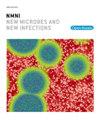耐大肠菌素的大肠埃希菌共产 IMP-1 和 OXA-58 碳青霉烯酶的鉴定和特征描述
IF 2.9
Q2 INFECTIOUS DISEASES
引用次数: 0
摘要
背景由于标准抗生素难以治疗的感染,耐碳酸培南的不动杆菌越来越受到全球关注。在此,我们发现了一种以前未定性的临床分离株醋肽杆菌,它能同时产生 IMP-1 和 OXA-58。我们还检测了与抗生素敏感性和耐药性相关的基因(包括 blaIMP)的表达情况。方法该分离株作为 Acinetobacter sp. NBRC 110496 存于国家技术与评估研究所(NITE)。根据临床和实验室标准研究所(CLSI)的断点来确定敏感性。结果该分离菌对β-内酰胺类耐药,包括广谱头孢菌素和碳青霉烯类、多粘菌素和三甲双胍/磺胺甲噁唑。基因组分析确定该分离株为大肠杆菌,含有 blaIMP-1、blaOXA-58、blaOXA-670、aac(6′)-Ib、aac(6′)-Ij、ant(3")-II、aph(3')-VI、msrE、mphE 和 sul1。秋水仙素抗性与 eptA-like 基因有关,该基因编码一种脂质 A-修饰酶。基于 SNP 的系统发育分析表明,该菌株与日本分离的其他菌株存在聚类。本研究中描述的产 IMP-1/OXA-58 菌株具有围绕 blaIMP-1、aacA 和 sul1 的新型整合子结构。该分离株可能是产碳青霉烯酶菌的储库。这项研究表明,筛查耐大肠菌素的分离株对于保留大肠菌素作为耐多药细菌的治疗药物至关重要。在亚洲发现这种耐多药分离株以及它在全球传播的危险应引起人们的严重关注。本文章由计算机程序翻译,如有差异,请以英文原文为准。
Identification and characterisation of colistin-resistant Acinetobacter colistiniresistens co-producing IMP-1 and OXA-58 carbapenemases
Background
Carbapenem-resistant Acinetobacter is of increasing global concern because infections are challenging to treat with standard antibiotics. Here, we identified a previously uncharacterised Acinetobacter sp. clinical isolate as Acinetobacter colistiniresistens co-producing IMP-1 and OXA-58. We also examined expression of genes related to antibiotic susceptibility and drug resistance, including blaIMP.
Methods
The isolate was deposited at the National Institute of Technology and Evaluation (NITE) as Acinetobacter sp. NBRC 110496. Susceptibility was defined according to the Clinical and Laboratory Standards Institute (CLSI) breakpoints. Genomic and clonal analyses were performed to identify species and resistance genes.
Results
The isolate was resistant to β-lactams, including broad-spectrum cephalosporins and carbapenems, polymyxins, and trimethoprim/sulfamethoxazole. Genomic analysis identified the isolate as A. colistiniresistens harbouring blaIMP-1, blaOXA-58, blaOXA-670, aac(6′)-Ib, aac(6′)-Ij, ant(3”)-II, aph(3’)-VI, msrE, mphE, and sul1. Colistin resistance was associated with the eptA-like gene, which encodes a lipid A-modifying enzyme. SNP-based phylogenetic analysis revealed that the strain clustered with other strains isolated in Japan. The IMP-1/OXA-58-producing strain described in this study has a novel integron structure surrounding blaIMP-1, aacA and sul1.
Conclusions
Colistin-resistant IMP-1/OXA-58-co-producing A. colistiniresistens was identified in a patient. This isolate could serve as a reservoir for carbapenemase-producing organisms. This study suggests that screening for colistin-resistant isolates is crucial to preserve colistin as a therapeutic agent for multidrug-resistant bacteria. Identification of this MDR isolate in Asia, and the danger of it spreading worldwide, should raise serious concerns.
求助全文
通过发布文献求助,成功后即可免费获取论文全文。
去求助
来源期刊

New Microbes and New Infections
Medicine-Infectious Diseases
CiteScore
10.00
自引率
2.50%
发文量
91
审稿时长
114 days
 求助内容:
求助内容: 应助结果提醒方式:
应助结果提醒方式:


